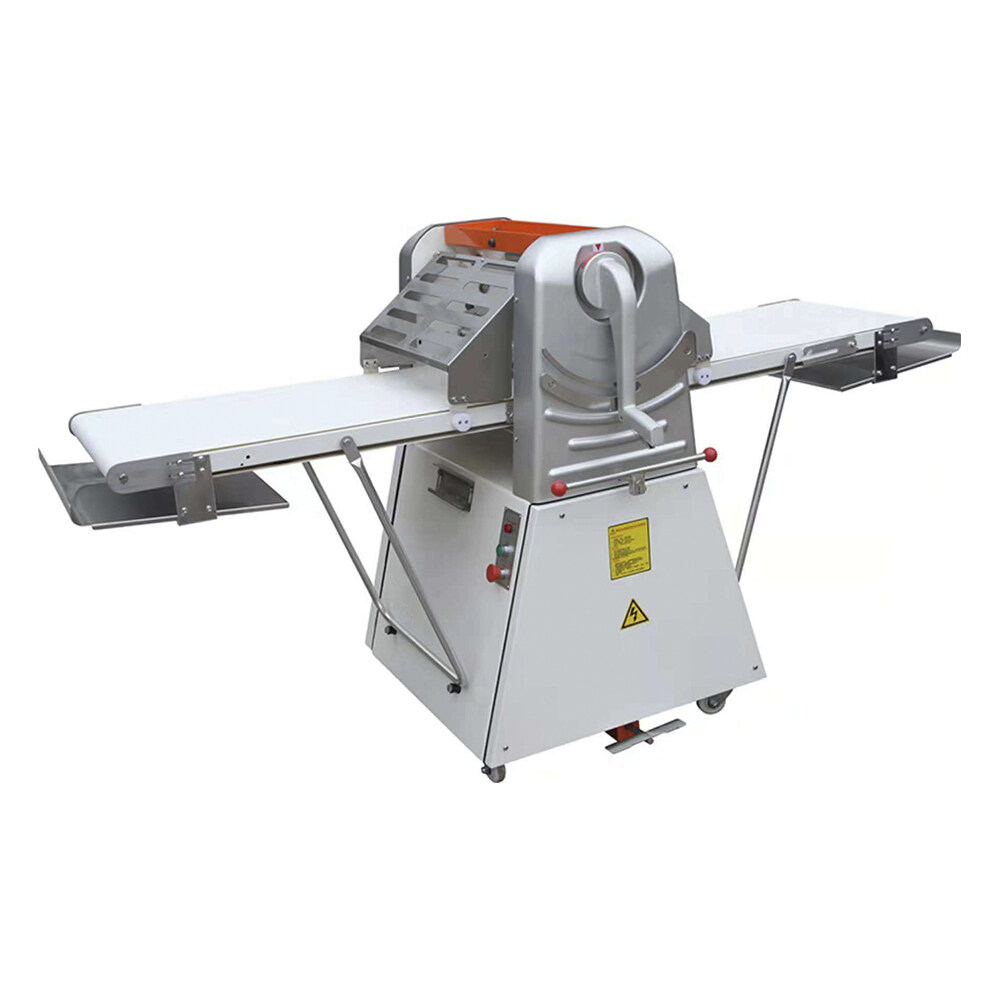Email format error
Email cannot be empty
Email already exists
6-20 characters(letters plus numbers only)
The password is inconsistent
Email format error
Email cannot be empty
Email does not exist
6-20 characters(letters plus numbers only)
The password is inconsistent


In the bustling world of commercial baking, efficiency and consistency are paramount. One of the most indispensable tools that modern bakeries rely on is the commercial bakery dough sheeter. This powerful machine not only enhances productivity but also ensures uniformity in the final product. In this comprehensive blog, we will delve into the many facets of the commercial bakery dough sheeter, from its functionality and benefits to its different types and maintenance tips.
Understanding the Commercial Bakery Dough Sheeter
A dough sheeter is a specialized piece of equipment designed to roll out large quantities of dough to a consistent thickness. This machine is a staple in bakeries, pastry shops, and pizza establishments. The dough sheeter is capable of handling various types of dough, including pastry, pizza, and bread dough, making it a versatile tool in any commercial kitchen.
How Does a Commercial Bakery Dough Sheeter Work?
The primary function is to flatten and stretch dough evenly. The machine typically consists of two rollers through which the dough passes. The distance between these rollers can be adjusted to achieve the desired thickness. As the dough passes through the rollers, it is stretched and flattened, producing a uniform sheet of dough ready for further processing.
Key Components of a Commercial Bakery Dough Sheeter
- Rollers: The heart of the dough sheeter, these can be adjusted to control the thickness of the dough.
- Conveyor Belts: These transport the dough through the machine, ensuring a continuous process.
- Adjustable Thickness Settings: Allows bakers to customize the thickness of the dough for various recipes.
- Safety Features: Modern dough sheeters come equipped with safety mechanisms to prevent accidents during operation.
Benefits of Using a Commercial Bakery Dough Sheeter
Implementing a bakery dough sheeter into your baking process offers numerous advantages, particularly in a high-demand setting.
Increased Efficiency
One of the most significant benefits is the substantial increase in efficiency. Manually rolling out dough can be time-consuming and physically demanding. A dough sheeter automates this process, allowing bakers to produce large quantities of dough in a fraction of the time. This efficiency translates to increased productivity and the ability to meet higher demand without compromising quality.
Consistency and Uniformity
Uniformity is crucial in baking. Whether you’re making pastries, pizzas, or bread, having a consistent thickness ensures even baking and a uniform final product. A dough sheeter guarantees that every sheet of dough is identical, which is essential for maintaining product quality and customer satisfaction.
Versatility
A dough sheeter is a versatile tool that can handle different types of dough. This versatility is particularly beneficial for bakeries that produce a wide range of products. Whether you need thin sheets for delicate pastries or thicker ones for hearty pizzas, a dough sheeter can be adjusted to meet these varying requirements.
Types of Commercial Bakery Dough Sheeters
The dough sheeters come in various types, each designed to cater to different needs and preferences. Understanding the different types can help bakers choose the right one for their operations.
Floor Model Dough Sheeters
Floor model dough sheeters are large, freestanding machines designed for high-volume production. These are typically found in larger bakeries and commercial kitchens where there is a need to produce large quantities of dough daily. They offer robust performance and can handle thicker and tougher doughs.
Bench Model Dough Sheeters
Bench model dough sheeters are smaller and designed to be placed on countertops. They are ideal for smaller bakeries, pastry shops, and restaurants with limited space but still require the efficiency of a dough sheeter. Despite their smaller size, bench models are quite powerful and can handle a significant amount of dough.
Reversible Dough Sheeters
Reversible dough sheeters are designed to allow the dough to be passed through the rollers in both directions. This feature is particularly useful for delicate doughs that require careful handling. The reversible function can save time and reduce the need to reposition the dough manually, enhancing overall workflow.
Choosing the Right Commercial Bakery Dough Sheeter
Selecting the right dough sheeter involves considering several factors to ensure it meets your specific needs.
Production Volume
The volume of dough your bakery needs to produce daily is a critical factor in choosing a dough sheeter. High-volume bakeries will benefit from a floor model sheeter, while smaller establishments may find a bench model sufficient.
Type of Dough
Consider the types of dough you work with most frequently. If you primarily make pastries, you might need a sheeter that can roll very thin sheets. For pizza dough or bread, a model that can handle thicker doughs might be more appropriate.
Space and Layout
The available space in your kitchen will also influence your choice. Floor models require more space but offer higher capacity, whereas bench models are compact and ideal for smaller spaces.
Budget
Budget is always a consideration in any equipment purchase. While the dough sheeters can be a significant investment, they can also save money in the long run by increasing efficiency and reducing labor costs. Evaluate your budget and consider the potential return on investment when making your decision.
Maintenance and Care for Commercial Bakery Dough Sheeters
Proper maintenance is essential to ensure the longevity and optimal performance of your dough sheeter.
Regular Cleaning
Cleaning your dough sheeter regularly is crucial. Dough residues can accumulate on the rollers and other parts of the machine, potentially affecting its performance and hygiene. Use a soft cloth and mild detergent to clean the rollers and conveyor belts after each use. Ensure the machine is turned off and unplugged before cleaning to avoid accidents.
Lubrication
Keeping the moving parts of your dough sheeter well-lubricated will ensure smooth operation and prevent wear and tear. Refer to the manufacturer’s guidelines for the recommended lubrication schedule and type of lubricant to use.
Inspections and Repairs
Regularly inspect your dough sheeter for any signs of damage or wear. Addressing minor issues promptly can prevent them from becoming major problems that require costly repairs. If you notice any unusual noises or performance issues, it might be time to call a professional for a thorough inspection and repair.
Innovations in Commercial Bakery Dough Sheeters
The world of dough sheeters is not static; continuous innovations are being introduced to enhance their functionality and efficiency.
Automated Features
Modern dough sheeters come equipped with automated features that further streamline the baking process. These may include programmable settings for different dough types and thicknesses, reducing the need for manual adjustments and improving consistency.
Advanced Safety Features
Safety is a paramount concern in any commercial kitchen. Innovations in dough sheeter design have led to the incorporation of advanced safety features such as automatic shut-off mechanisms, emergency stop buttons, and safety guards to protect operators from accidents.
Energy Efficiency
As sustainability becomes increasingly important, manufacturers are developing dough sheeters that consume less energy without compromising performance. Energy-efficient models help reduce operational costs and the bakery's carbon footprint.
Practical Applications of a Commercial Bakery Dough Sheeter
The versatility makes it an invaluable tool for various applications in a bakery setting.
Pastry Production
For pastry chefs, a dough sheeter is essential for creating thin, even layers of dough for items such as croissants, puff pastries, and tarts. The consistent thickness achieved by a dough sheeter ensures even baking and a professional appearance for each pastry.
Pizza Dough Preparation
Pizzerias benefit greatly from using a dough sheeter to prepare pizza dough. The machine can quickly roll out large batches of dough to the desired thickness, ensuring that each pizza has a consistent crust, which is crucial for both quality and customer satisfaction.
Bread Dough Handling
While bread dough often requires a thicker consistency, a dough sheeter can still play a role in preparing large batches of dough for various types of bread. By pre-sheeting the dough, bakers can save time and ensure uniformity before the final shaping and baking processes.
Case Study: The Impact of a Dough Sheeter in a High-Volume Bakery
To illustrate the practical benefits, let’s consider a case study of a high-volume bakery.
Background
Sunrise Bakery, a well-established bakery known for its wide range of pastries and bread, faced challenges in keeping up with increasing demand. The manual process of rolling out dough was time-consuming and inconsistent, leading to variations in product quality.
Solution
The bakery invested in a dough sheeter, opting for a floor model due to their high production volume. The machine was integrated into their daily operations, handling everything from croissant dough to pizza bases.
Results
The introduction of the dough sheeter led to several notable improvements:
- Efficiency: The time required to roll out dough was reduced by 50%, allowing the bakery to increase its output significantly.
- Consistency: Every sheet of dough was uniform in thickness, resulting in a more consistent product quality.
- Labor Savings: The reduction in manual labor allowed staff to focus on other tasks, improving overall productivity and job satisfaction.
Conclusion: The Future of Commercial Bakery Dough Sheeters
A dough sheeter is more than just a piece of equipment; it is a game-changer for bakeries looking to enhance their efficiency, consistency, and product quality. As technology continues to advance, we can expect to see even more innovative features that will further transform the baking industry.
For any bakery, investing in a commercial bakery dough sheeter is a strategic decision that can lead to significant long-term benefits. By understanding the different types, benefits, and maintenance requirements, bakers can make informed choices that will help them stay competitive in a demanding market.
Whether you run a small pastry shop or a large commercial bakery, a dough sheeter can elevate your operations, ensuring that every product that leaves your kitchen is of the highest quality. Embrace the future of baking with a dough sheeter and watch your bakery thrive.